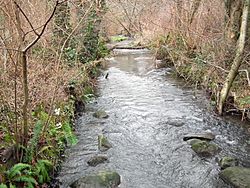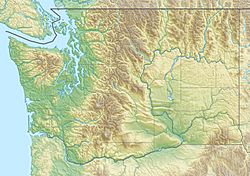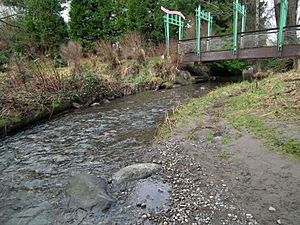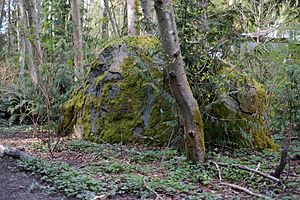Thornton Creek facts for kids
Quick facts for kids Thornton Creek |
|
|---|---|
 |
|
|
Location of the mouth of Thornton Creek in Washington
|
|
| Country | United States |
| State | Washington |
| County | King |
| Physical characteristics | |
| Main source | Jackson Park Golf Course Seattle 47°43′45″N 122°19′13″W / 47.72917°N 122.32028°W |
| River mouth | Lake Washington 47°41′42″N 122°16′17″W / 47.69500°N 122.27139°W |
| Length | 18 mi (29 km) |
| Basin features | |
| Basin size | 12.1 sq mi (31 km2) |
Thornton Creek is a system of creeks and small rivers. It stretches about 18 miles (29 km) through Shoreline and Seattle. The creek ends by flowing into Lake Washington.
The area around the creek is called its watershed. This watershed covers about 12 square miles (31 km²). It is the biggest watershed in Seattle. Even though it's in a city, many different plants and animals live here. You can find frogs, newts, ducks, and other birds. Sometimes, you might even see a beaver or a coyote. Over 200,000 people also live in this area.
Thornton Creek starts in a few places. One branch begins near Jackson Park Golf Course in Shoreline. Another starts near Sunny Walter-Pillings Pond in Licton Springs. The creek flows through several Seattle neighborhoods. These include Maple Leaf, Lake City, Victory Heights, Meadowbrook, and Matthews Beach. Finally, it reaches Lake Washington at Matthews Beach Park.
Wildlife and Caring for the Creek
Thornton Creek flows through Meadowbrook Pond. This pond is a stop for birds that migrate, meaning they travel long distances. Sometimes, a beaver or coyote might visit too. Long ago, before European settlers arrived, Native American tribes lived near Lake Washington. One of their old home sites was found near where Thornton Creek meets the lake.
In the early 1900s, the creek was very healthy. It was a place where at least five types of Pacific salmon and trout laid their eggs. Many other animals also lived there. These included insects, frogs, muskrats, bats, and various birds.
Over time, buildings and roads were built around the creek. People did not think about how this would affect the animals. The number of different species living there went down. The creek became a typical city waterway, not as healthy as it once was.
Today, people are working to make the creek healthy again. They are building storm water retention areas. These help control water flow during heavy rains. They are also restoring natural areas. An Environmental Learning Center next to a school helps teach people about the creek. A fish ladder was also built. This helps fish swim upstream to lay eggs. These efforts have helped native plants and wildlife return to the creek.
Thornton Creek Water Quality Channel
For many years, large parts of Thornton Creek flowed underground. They were hidden inside big pipes called culverts. A big section of the creek ran under the parking lot of Northgate Mall.
People who live nearby wanted to bring the creek back to the surface. This process is called daylighting. They worked with the City of Seattle and building companies. They wanted to uncover parts of the buried creek.
In 2004, the City of Seattle bought 2.4 acres (1 hectare) of the Northgate Mall parking lot. They started building the Thornton Creek Water Quality Channel. This channel opened in 2009. It helped achieve several goals in a small space. It cleans runoff water from 680 acres (275 hectares) of land. It also provides a mix of housing and public green space. The channel has many native plants. These plants help clean the water and make the area beautiful.
Many groups of citizens have helped clean up wetlands near the creek. They also teach people about how important a healthy creek is for the neighborhood. Their efforts have inspired many other restoration projects in Seattle.
Neighborhoods of the Thornton Creek Watershed
- Southeast neighborhoods of the city of Shoreline (where the north fork of the creek begins)
- Lake City neighborhoods:
- Olympic Hills
- Victory Heights
- Meadowbrook (where the creek's forks join)
- Matthews Beach
- Northgate neighborhoods:
- Pinehurst
- Licton Springs–North College Park (where the south fork of the creek begins)
- Maple Leaf
- Northgate Mall
 | William M. Jackson |
 | Juan E. Gilbert |
 | Neil deGrasse Tyson |





